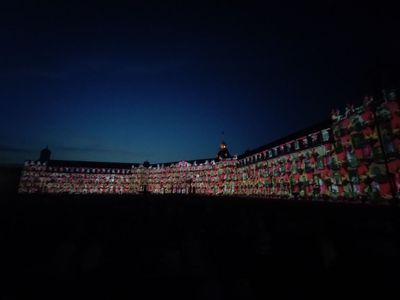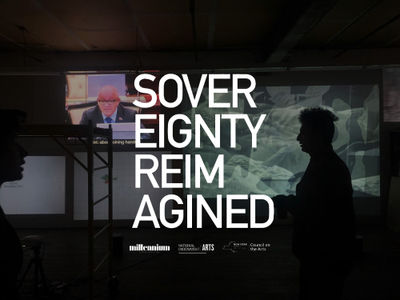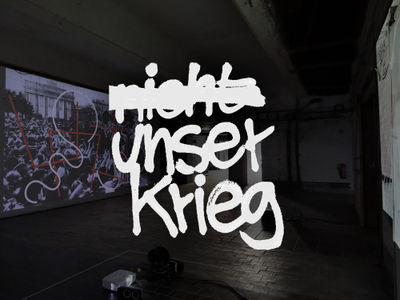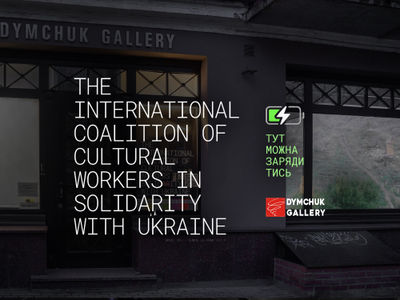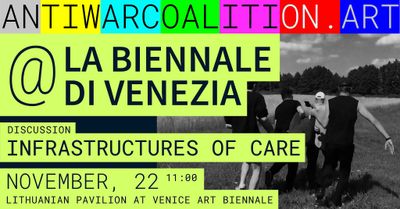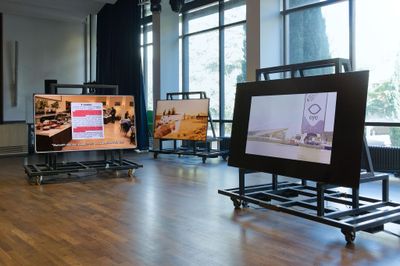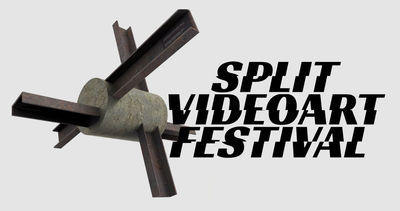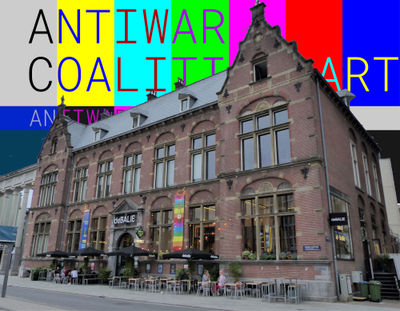

Almaty/KZ, Graz/AT, Kharkiv/UA, Tbilisi/GE, Warsaw/PL
Cultural Landscapes in Flux: The Artistic Responses to War and Colonialism, online discussion
Warsaw/PL
Centrum Społeczności Romskiej
The Subtle Influence of Culture: Mechanisms of Border Control. Presentation and discussion
Centrum Społeczności Romskiej, Puławska 39/85, Warsaw
Poznan/PL
Pradmova festival
"Archive of contemporary art as a tool for cultural activism" public discussion in frames of Pradmova festival
Al. Niepodległości 4, 61-874 Poznań hall В
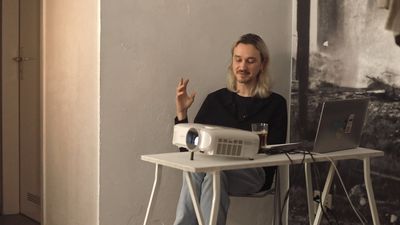
Berlin/DE
ABA
From War to War: Illustration and Militarization of Visual Space in Belarus public lecture by Uladzimir Hramovich / BY
UQBAR project space, Schwedenstraße 16, 13357 Wedding, Berlin
Karlsruhe/DE
ZKM
SENSE OF SAFETY @ ZKM. A Bridge of Solidarity with the YermilovCentre in Kharkiv
ZKM, Lorenzstraße 19, 76135 Karlsruhe, Museum balcony
Amsterdam/NL, Kharkiv/UA
European Cultural Foundation / The International Documentary Film Festival Amsterdam (IDFA) / YermilovCentre
DocTalk 'Dear Beautiful Beloved' by Juri Rechinsky
De Balie, Kleine-Gartmanplantsoen 10, 1017 RR Amsterdam, YermilovCentre, Svobody Square, 4, Kharkiv
Białystok/PL
Gallery Arsenal
Are you here with us? #3
Gallery Arsenal, ul. Adama Mickiewicza 2, Białystok
Poznan / Kharkiv/PL/UA
Domie / YermilovCentre
Echoes of Shelters | Hybrid Performative Walk with Kharkiv
Poznań: CK Zamek, Święty Marcin 80-82 / Kharkiv: YermilovCentre, Svobody Square, 4
Berlin, Potsdam/DE
Schlosslichtspiele
Radio bridge "Sense of safety"
Białystok/PL
Gallery Arsenal
Are you here with us? #2
Gallery Arsenal, ul. Adama Mickiewicza 2, Białystok
Warsaw/PL
Fundacja W Stronę Dialogu
Romani AFU soldiers rescue Ukrainian children kidnapped by Russians: Exhibition opening and public program
Fundacja W Stronę Dialogu and Centrum Społeczności Romskiej, ul. Skrzetuskiego 36a, 02-665 Warszawa

Karlsruhe/DE
ZKM
SENSE OF SAFETY @ ZKM. Opening & Concert featuring FO SHO
ZKM, Lorenzstraße 19, 76135 Karlsruhe, Museum balcony, Media theatre
Tbilisi/GE
Bouillon Group
Let me show you something beautiful: Ethics and esthetics in "war photography" in Ukraine and Georgia
Tbilisi Photography & Multimedia Museum M. Kostava 14., Hotel "Stamba", D block, Second floor.
Berlin/DE
Sergey Bratkov / Eleonora Frolova
How to survive: Metacosmia / YermilovCentre
Charkiw-Park, Rothenburgstraße 33, 12165 Berlin, Germany
Leipzig/DE
Revolutionale festival / Leipzig Festival of Lights
Safety as Collective Practice, screening program in frames of Revolutionale Festival
Ringcafé Roßplatz 8, Leipzig, Saxony, Germany
Białystok/PL
Gallery Arsenal
Are you here with us? / Czy jesteśce tu z nami?
Gallery Arsenal, ul. Adama Mickiewicza 2, Białystok
Tbilisi/GE
Bouillon Group
"Let me show you something beautiful": Pop-up exhibition of Ukrainian photographers
on the opposite street of the Georgian parliament
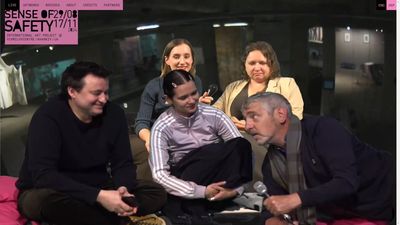
Amsterdam/NL
THE VOID
Hybrid event and streaming from the THE VOID studio in frames of Bridges of Solidarity
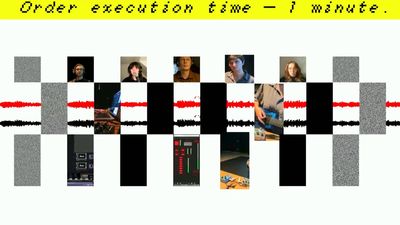
Stuttgart/DE
Musik der Jahrhunderte
Audiovisual performance "Rehearsal of the Victory Day Gig # 9"
Musik der Jahrhunderte, Siemensstraße 13, 70469 Stuttgart

Düsseldorf/DE
Atelier Helmut Schweizer
Screening of the film "Civilians. Invasion" by Daniil Revkovskyi and Andrii Rachynskyi
Atelier Helmut Schweizer, Lierenfelder Straße 39, Düsseldorf
Graz, Austria/AT
ZIEGEL. Atelier Gemeinschaft ukrainischer Künstler:innen
CURATOR'S TALK
ZIEGEL. Atelier Gemeinschaft ukrainischer Künstler:innen, Strauchergasse 6, Graz, Austria 8020
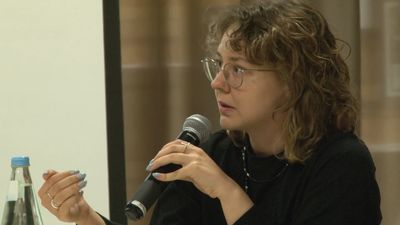
Berlin/DE
nGbk
From soil to solidarity
nGbk, Karl-Liebknecht-Straße 11/13, 1st floor (access via escalator), 10178 Berlin
Kharkiv/UA
YermilovCenter
Performance "Digestion"
YermilovCenter, Svobody Square, 4, Kharkiv
Ivano-Frankivsk/UA
Asortymentna kimnata
Playing with Safety: No duality, only duality
Asortymentna kimnata, Sichovyh Striltsiv 15, Ivano-Frankivsk, Ukraine
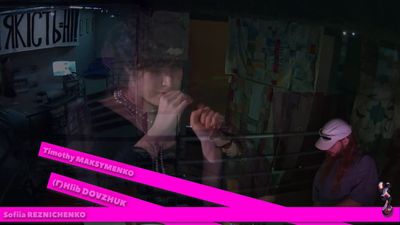
Krakow/PL
UKRAINATV
Hybrid event and streaming from the UKRAINATV studio in frames of Bridges of Solidarity
Karlsruhe/DE
Schlosslichtspiele
Sense of Safety on the Antiwar Day
Schloßplatz, Karlsruhe
Kharkiv/UA
YermilovCenter
Core exhibition "Sense of safety": Curatorial excursion
YermilovCenter, Svobody Square, 4, Kharkiv

Kharkiv/UA
YermilovCenter
"How can the Analog Exhibition Space be combined with the Digital World?" A lecture by Thomas Hirschhorn
YermilovCenter, Svobody Square, 4, Kharkiv
/IT
Pavilion of Lithuania. Venice Biennale 2022, Venice
Infrastructures of Care
speakers
Caring is generally described as invisible, low-paid labor hidden away in a private sphere. However, the pandemic protests around the world, Russia's full-scale invasion of Ukraine has sparked interest in moving concerns from private, serving categories to political ones. As Judith Butler points out, our political activism can only be carried out with the support of our fragile, vulnerable bodies. In such a concept, fragility and vulnerability become not a bug, a weakness that needs to be overcome, but a starting point for our solidarity and collectivity.
The discussion is aimed at comprehending artistic and curatorial practices that are associated with building care infrastructures, criticizing patriarchal political structures for the sake of a more inclusive, diverse, horizontal structure of society.
Participants:
1. Volha Davydzik is a philosopher and researcher. Researcher at Leuphana University of Lüneburg, Germany (Re-building Solidarity and Networks of Care Through Art: Political Art Practices Under Authoritarianism). Since 2018-till 2022-lecturer at Lingnan Normal University, China. Research focus: Theory of nations, national identity/Colonialism, Postcolonialism, Emancipation/Biopolitics /Feminism, Soft tactics of Resistance, Anti- growth Theory, Economics of Care/ New ontology, Forms of Collectives and Solidarity/ Contemporary Art, Cultural Critics.
2. Azar Mahmoudian is a curator and educator. She is currently directing the independent study program The Summer School: For a Summer Yet to Come in Tehran. She co-ran the collective space kaf in Tehran (2010-2015) and co-curated Shifting Panoramas, program of seminars, residencies and production grants in various institutions and off-spaces in Tehran and Berlin (2017-2021). Her curatorial work includes biennial settings as well as long term, research-driven projects, most recently the multi-chapter program of moving image practices, Sensible Grounds at SAVVY, Lux, Fundación Antoni Tàpies, Betonsalon and Nida Art Colony, among others (2018-2021).
3. Tatiana Kochubinska is an independent curator, writer, and lecturer who has worked with the Research Platform of the PinchukArtCentre in Kyiv. As a curator, Tatiana Kochubinska is interested in issues of responsibility, Soviet history and its relation to contemporary society, the psychological state of the individual, and personal memories of the transgressive, crossing borders 1990s. She co-curated Future Generation Art Prize@Venice, a side event at the 58th Venice Biennale in 2019. Tetiana has collaborated with various cultural institutions and also designed online and offline courses on contemporary art. In 2020 she was invited by the Polish magazine Obieg to co-edit a special issue about Ukrainian art.
4. Neringa Bumblienė is a curator, researcher and writer. She has a Master Degree in Curatorial Studies and is an alumnus of the Ecole du Magasin, France. Since 2014, she works as a curator at the Contemporary Art Centre (CAC) in Vilnius, Lithuania. She is the curator of the Pavilion of Lithuania at the 59th Biennale di Venezia with the project Gut Feeling by Robertas Narkus in 2022 and the artistic director of the 1st Vilnius Biennial for Performance Art to be held in 2023.
5. Antonina Stebur (moderator) is an independent curator, art writer, and researcher. She lectures on activist practices in the arts at the Universität der Künste Berlin. Antonina is a co-founder of the #damaudobnayavbytu, the project on gender discrimination in Belarus, a co-founder of the research group on activist art and political performance “Spaika.media”, member of the “AGITATSIA” research group. She also is a co-founder of the International Coalition of Cultural Workers Against the War in Ukraine (www.antiwarcoalition.art). Antonina Stebur curated numerous exhibitions of contemporary art in Minsk, Kyiv, Saint-Petersburg, Paris, Chóngqìng, Yerevan and Warsaw. Her writings have been published in Partisan, ArtReview, ARTMargins, Block magazine, SZUM, and syg.ma among others.

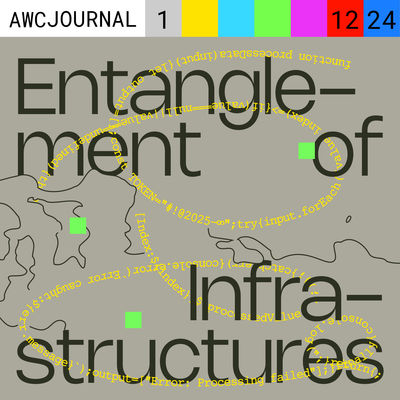
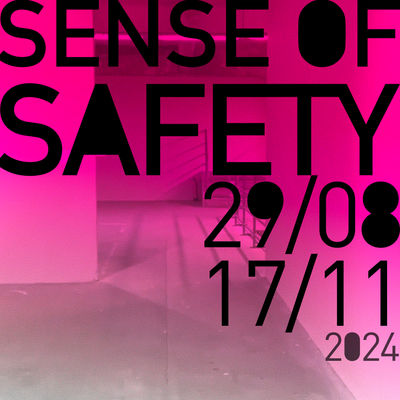
.png?alt=media&token=5486f5fd-dbc1-4a74-bb87-769b6d64d2a1)

